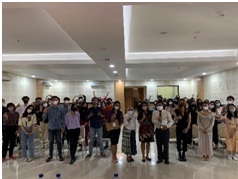INDONESIAN FEMALE MIGRANT WORKERS ISSUES IN GENDER PERSPECTIVE
The FISIP International Relations Study Program, Udayana University held a seminar on Wednesday, 18 May 2022 which took place in the FISIP Hall, Unud Sudirman Campus. The seminar with the theme “Gender positionality, global migration, and national identity: lessons learned from research on Indonesian migrant workers in the UAE” discussed the dominance of Indonesian women as migrant workers in the UAE (Saudi Arabia) and a critical analysis of their relationship to gender and gender positionality. or social marginalization in global migration and national identity. Dr. Titiek Kartika Hendrastiti, as a speaker is also a Lecturer in the Public Administration Study Program at the University of Bengkulu. She conveyed about how intersectionality can be connected with the issue of women domestic migrant workers. Intersectionality itself is related to the understanding of humans formed by the interaction of different social locations such as race, ethnicity, gender, class, geography, and age. Such interactions usually occur in the context of connected systems and power structures, such as laws, policies, state governments, and political unions.
The existence of women's dominance as domestic migrant workers raises gender positionality. This is because professional migrant workers are managed by the Ministry of Manpower, while migrant workers are under the management of the Immigration Department of the Ministry of Home Affairs so that protection and monitoring coverage are limited. The position of women migrant workers is the lowest position in family regulations, global migration, employment systems, and employment contracts. Women migrant workers who come from poor countries are often monitored and monitored closely so that they are at risk of being isolated from their families, agencies (origin and destination countries), and the state. Indonesian women domestic migrant workers in the UAE carry identities that are seen as intersectional. These identities include race, ethnicity, religion, socio-economic class, sexuality, culture, language, nationality, legal status, and politics which make the issue of migrant workers also an issue of international relations. The internalization of the identity of Indonesian domestic workers in the UAE society creates a stereotype of Indonesia as a helper nation.
The seminar, which was attended by students and fellow lecturers, opened up wider insights regarding gender issues that are widely circulating in Indonesian society, because there is marginalization of issues of gender justice and the role of women in global migration governance. Then the experience, knowledge, rights and activism of women have not been sufficiently taken into account in the context of global migration, they tend to be considered normal because most of them are embedded in everyday life. Mainstream theoretical and methodological approaches based on top-down relationships and deductive reasoning cannot fully reveal gender inequality and social marginalization, so a transdisciplinary approach is needed. The study of intersectionality then becomes a new and important trend in gender analysis if the results of the study are used to improve policy. The seminar ran smoothly and interactively, and was closed with a symbolic handover of the certificate by the institution's representative, Dr. I Made Anom Wiranata, to the presenters and the group photo session.









